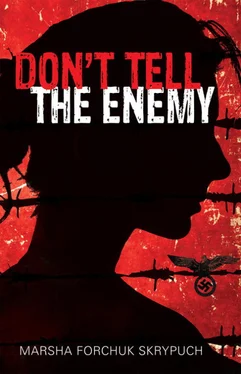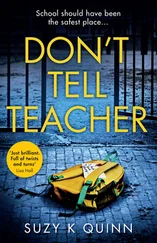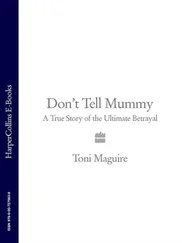Frau Hermann had warned us, though. “I am keeping track of every single candy,” she said, “so don’t bother trying to steal it.”
Later in the day I carried a tray laden with cheese and sausage slices and listened to the children’s parents chatter about mundane things. As my feet pinched in the stiff leather shoes and my shoulders ached from the weight of the tray, I tried to concentrate on the threads of conversation, hoping to pick up something useful.
My ears perked up at the mention of silk stockings. A group of women, all wearing bright dresses, stood in the corner of the room discussing the best place to get stockings.
“My brother is stationed in Lemberg and he buys them on the black market for me,” said a woman in green chiffon. I knew Lemberg was the German name for Lviv.
“He goes into a back alleyway to buy stockings?” asked a pink-clad woman.
“Well, not him personally. One of his Slav workers gets them.”
“Ask if he can get me a couple of pairs,” said a third woman.
When I got home after the party, I told Mama about what I’d heard. “We should sell the stockings — the ones from Auntie Stefa — in Lviv,” I said. “There’s a whole box full.”
“That’s not a bad idea,” said Mama. “I didn’t want to try selling them around here because the Nazis would just find our box and confiscate them all.”
* * *
A few nights later Mama took a dozen of the stocking packages and wrapped them in a thin length of cloth. Maria and I helped her bind them to her back, winding the cloth around her waist snugly so it wouldn’t show through her clothing.
“But what about your cleaning for Frau Hermann?” Maria asked.
“Krystia will have to take my shift,” said Mama. “If Frau Hermann notices, tell her I have a bad cold and don’t want to make her sick.”
There was a light tapping at the door. Mama opened it and a young man and woman stepped in. “Girls,” said Mama. “This is Tadeusz and Sofia Podorski. We will be sneaking onto the freight train to Lviv tonight. I should be back tomorrow, or the next day at the latest. Don’t worry about me.”
She kissed us each and was gone.
Of course we did worry. Once Maria and I were finished our chores, we wrapped ourselves up in our comforter and lay in bed, listening for the rumbling sound of an arriving train, and willing Mama to be on it.
I didn’t know the Podorskis personally, except that they were brother and sister. Their family was Polish and they had been wealthy before the war. Their father was one of the first people the Soviets killed — hanging him in the town square. Their mother had been sent to a labour camp in Siberia. What were they selling on the black market? Perhaps some jewels and antiques they had been able to hide away? As in Mama’s case, it was better to trade anonymously in the big city, because otherwise their precious items would be confiscated.
I was glad that Mama was able to travel with two other people, and people who knew the black market, but I couldn’t help but feel uneasy the whole time she was gone.
Three nights later she stepped into the house in the wee hours of the morning, so covered in a thin layer of coal dust that when she smiled at us, it looked like her teeth were floating in the air. Maria and I jumped out of bed and threw our arms around her, not worrying about the dust we were getting all over the place, just thankful that she was safe.
“Was the trip a success?” I asked.
“It was,” said Mama. “Look what I got.” She took a cloth bag from inside her blouse.
I picked it up. “Buckwheat?”
“Yes,” said Mama, her white teeth grinning. She emptied one of her pockets. “I’ve got two big bags of it.”
Buckwheat kasha was filling, and when boiled in water it expanded, so these two small bags would make many meals. We kept one of the bags for ourselves; the second was for our friends in the ghetto.
Mama woke as I was leaving to take the buckwheat there. “Wait, Krystia,” she said, rubbing the sleep out of her eyes. “Where are those small hacksaws?”
“They’re here,” I said, reaching for them on a high shelf. “Why do you want them?”
“Take some to the ghetto,” said Mama. “I overheard conversations while I was in Lviv. Something about deportations. If the Nazis start deporting Jews by train, these would come in handy.”
I took two of the tiny hacksaws and slipped them into my pocket, then hugged Mama before I left.
Nathan looked at the hacksaws quizzically when I passed them through the barbed wire. “Do you really think they’re going to deport us?” he asked.
“Maybe not,” I said. “But Mama overheard something about deportations.”
“With a hacksaw like this, I might be able to saw through a bolted-down window or door if the Nazis sent me away by train.” He slipped them into his pocket.
I passed him the buckwheat kasha next.
Nathan poked some money through the gap in the barbed wire. “Thank you, Krystia. Anything you can get, you know we’re grateful for. And we saved some of what you brought us the last time, for Chanukah.”
* * *
The Commandant had a different plan for Chanukah. He announced that unproductive Jews were to be sent to a labour camp. He claimed this was to alleviate the food shortage and typhus risk in our town.
On December 15th, the second day of Chanukah, the gates of the ghetto were opened and police swarmed in. They brought out more than a hundred screaming, weeping people, mostly toddlers and older women. They were loaded onto horse-drawn wagons and surrounded by gun-wielding police. We watched in despair as those wagons passed down our street and out of town. How could any of them possibly escape? The hacksaws were useless against all those armed police.
I searched each face as the wagons drove by, but couldn’t see Nathan or Dolik or Leon. But Mrs. Segal was on the last wagon. She sat still and dignified, clutching her cane as she was driven past the house where she used to live.
Our friends were not taken to a work camp. They were not deported. They were shot dead just a few kilometres out of town.
Chapter Twenty
Eating Hay
Mrs. Segal’s death made me even more determined to do everything I could to help the rest of her family live.
Mama made another trip to Lviv just as 1942 began. She had hoped to sell the rest of the stockings, as we had no food left. The chickens had stopped laying eggs in the cold weather, the tin of pork from Frau Schneider was long gone, and so were our precious jams and pickles. Maria and I worried about Mama, but we also waited in anticipation. Would she bring more buckwheat kasha? Maybe something better?
But when she returned two nights later, her face was black with bruises. Her coat was ripped and her pockets were empty.
“I had sold all the stockings,” she said, “and I was coming home with salt pork, biscuits and cash. But I was robbed on the train.” She slumped down into a kitchen chair.
I held a cool cloth to Mama’s face and Maria made her linden tea. We tried to comfort her, but all three of us felt defeated. That food was supposed to get us through the rest of the winter. What could we possibly do now? There was nothing else to sell and nothing we could barter for food. All we had to live on was the daily ration of one piece of bread, and water from the pump.
Auntie Polina visited a few days after that, her body so weak that she leaned heavily on a walking stick. It must have been sheer strength of will that got her to our doorstep. As we gathered close to the warmth of the wood stove, she reached into the depths of her pocket and brought out a dry wedge of cheese the size of her palm. “This is all I can spare,” she said. “It will be hard for you to get through the next few months, and for me as well.”
Читать дальше



![Quiet Billie - Don't mistake the enemy [СИ]](/books/421973/quiet-billie-don-t-mistake-the-enemy-si-thumb.webp)








